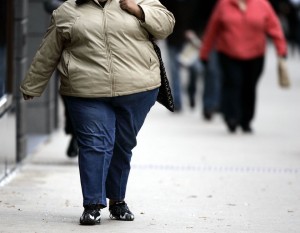 Approximately one-third of the U.S. adult population and 17 percent of children are considered obese according to CDC statistics.
Approximately one-third of the U.S. adult population and 17 percent of children are considered obese according to CDC statistics.
NPR’s special series “Living Large: Obesity in America” takes a look at what it truly means to be obese in the United States, a country getting larger and unhealthier by the second.
Why are Americans obese? Blame it on the lifestyle. Americans are eating–everywhere. We eat in our cars on the way to kids’ soccer games, on the way to work, in-between meals, and after school. With our lackadaisical view of standard mealtimes, we are not only eating more, but are eating processed foods that are quick and adaptable to our on-the-go lifestyles and it’s rubbing off on other countries. The French are getting fatter, too, according to NPR.
Although France is typically viewed as a counterexample to America’s growing obesity problem, obesity in France is rising slightly. The French pride themselves on their love of food and traditional meal times. The French also know how to properly prepare a meal, something that is vastly disappearing in the age of globalization and urbanization.
France may have a growing obese population but it is nothing in comparison to the United States, specifically the Southern region. The fattest county in the U.S. is Holmes County, Mississippi where the life expectancy is ten years less than the average across the country. It’s no coincidence that the fattest county in the U.S. is also one of the poorest. Processed foods with saturated fats and loads of sugar are convenient and cheap for families who can’t afford a fresher alternative.
“If you have two children to feed and you don’t have but $5, you are going to try to get a whole meal for the money that you have. Therefore, you might have to buy something that’s not as healthy as you want it to be in order for you and your children to have something to eat,” Valerie Moore, a single mother in Holmes County, said to NPR.
Many obese people find it difficult to do simple things such as riding in a car comfortably, going to amusement parks, flying or sitting down in restaurants because they are afraid of not fitting or breaking a chair.
 In addition to health problems like strokes, heart disease, hypertension, and diabetes, obese people are often treated like second-class citizens and drafted into hurtful stereotypes such as lazy, stupid, or klutzy. Popular American television shows like Family Guy, The Simpsons or Roseanne construct these cultural views of larger people when in reality overweight and obese Americans have all sorts of personalities and backgrounds.
In addition to health problems like strokes, heart disease, hypertension, and diabetes, obese people are often treated like second-class citizens and drafted into hurtful stereotypes such as lazy, stupid, or klutzy. Popular American television shows like Family Guy, The Simpsons or Roseanne construct these cultural views of larger people when in reality overweight and obese Americans have all sorts of personalities and backgrounds.
Efforts like First Lady Michelle Obama’s Childhood Obesity Initiative are a start to combating obesity. Making fresh food affordable is ultimately what will solve the problem such as Holmes County farmer Griffin McLaurin’s effort to convert 15 acres of his land to grow fresh produce and give to the regional nutrition programs.
“Every generation is getting weaker and wider,” McLaurin said to NPR. He said his generation hunted, fished, and worked in the garden. “But now children, that don’t ring a bell with them. Hopefully we can turn it around,” he said.
Also Read:
Major Grocery Stores Commit to Bringing Healthy and Affordable Produce to “Food Deserts”
Mississippi Holds Fattest State Title for Fifth Straight Year
